- Home
- Dave Eggers
The Parade Page 2
The Parade Read online
Page 2
The RS-80 reduced any doubt about meeting such a compressed schedule. Given they were paving during the dry season, no rain was plausible, and outside of rain, there were virtually no variables. When there were no variables and no distractions, Four could be counted on to complete any job on time or early. Beyond sleep and an occasional meal, Four did not rest while on assignment. He did not take breaks unless they were unavoidable.
“You been here before?” Nine asked.
“No,” Four said. He watched as Nine flung his hair from his eyes again and ran his hand over the totality of his skull. Soon the hair he’d just moved out of the way impeded his vision again. Preposterous, Four thought.
“This is your first assignment,” Four said.
“Yes,” Nine said.
“You understand your role?”
“Yes. Clear the road, mitigate obstacles.” Nine uttered the last two words with a tone of mock formality.
Four gave him a hard stare and took a breath. Their taxi passed a pair of police officers lounging in the back of a pickup truck, their legs latticed and feet bare. A line of schoolchildren walked by wearing khaki pants and bright white shirts and carrying books donated by some distant government. A flatbed truck sped by conveying a small mountain of bent and burned steel.
“Your job is to drive ahead with the quad and make sure nothing is on the road as I approach. Not a person. Not an animal. Nothing. Small rocks are fine. If you see deep grooves, you need to tell me. If you see a cavity, a tear, anything unusual, you inform me. Okay?”
“Yes.”
“You especially need to keep other vehicles off the surface. You need to clear cars, motorcycles, goats, cattle, bikes, anything heavy. A loaded cart or truck might rut the road and make the surface uneven. You understand?”
“Yes.”
“Some surface variation is acceptable, and almost inevitable in a place like this, but your task is to reduce these variations, which means reducing the number of vehicles and anything else using or crossing the road. Yes?”
“Yes.”
“If you find a significant surface variation, you are tasked with filling it in before the RS-80 arrives, and if the variation is too large to fix, you will have to radio me, or come back to me in person. Then we can assess whether we power down to fix the anomaly, or if we just pave over it. Okay?”
“Okay.”
“When I’m halfway to the next pod,” Four continued, “you go and check to be sure there is nothing and no one near that pod. The pods are curiosities to people, but they are everything to us. They contain the asphalt and the RS-80’s fuel. If even one is tampered with, our work ends. It was exceedingly difficult for the company to get all the pods here. You understand?”
“I do.”
“Even though they’re too heavy for anyone to lift, and sensors will tell us if any pod is molested, your job is to make sure there’s no one even near the next pod. No one touching it, sitting on top of it. Nothing like that. Got it?”
“Right. Clear obstacles, human and nonhuman. And no molesting.” Again Nine smiled as if he’d made a joke. Realizing that Four was not a receptive audience, Nine leaned into the window separating the back seat from the front, and, to the surprise of Four and the taxi driver, unleashed a stream of sentences in the regional dialect. Four remembered now that Nine’s profile had indicated he could speak the local tongue; it was one of the few qualifications he seemed to possess.
As they left the city and while Nine and the taxi driver carried on a spirited conversation, the makeshift shops and hotels gave way to shanties and piles of burning garbage. At the outskirts of town, through a veil of orange dust, Four could see where the road began. The RS-80 rested beside it, a low-slung machine painted a dull yellow and trimmed in black. Four had been assured that this machine was almost new, used only once, and even then for fewer than ten kilometers of roadway.
Nine pointed to it, and he and the taxi driver spoke excitedly. Nine turned back to Four. “He says he worked on a road crew once. He says he doesn’t believe this one machine does everything itself.”
Four got out of the taxi and paid the driver. It was half past 8:00 a.m., the sun already high above the tree line. He marked the time in his notebook and walked toward the paver. Four watched as Nine lingered at the taxi driver’s window, finishing with an elaborate handshake and an uproarious laugh. “No no no!” he roared to the driver, and jogged to catch up with Four.
III
IN THE PAST, paving a road like this would require the labor of at least four vehicles and twelve people. It was messy and toxic work. From a distance, the process had looked like a very slow and disorganized circus. A sixteen-wheel dump truck would drive backward, its bed lifted, pouring hot asphalt into the paver’s great funnel, which would then apply it to the road. Later, a roller would follow, compacting the surface and making it uniform. Workers, walking alongside, had to be present to ensure the smooth execution of every step.
But the RS-80 consolidated all of these tasks into an infinitely more efficient and elegant system. Instead of the asphalt being brought to the site by trucks, it was stored on the road in simple yellow pods, each about two meters square—they looked like enormous cubes with rounded corners, like unnumbered dice. Each pod would heat the asphalt via remote control, ensuring the mixture was ready when the RS-80 reached it. The RS-80 then would lift the pod until it locked into place atop the paver. The paver would then drink from it as it blackened the next ten kilometers. The work previously requiring a messy cluster of vehicles and people could now be done by one person in one machine.
Thus Four was dubious about the utility of Nine. Obstacles were unlikely, and satellite photography could find any notable impediments. In terms of human interference, certainly a factor in some areas of the world, all company research indicated this particular project had no local opposition. The road had been in the works for eighteen months, and regional support was unqualified. In the months leading up to Four’s arrival, his colleagues had cleared the land and graded the road, and all the while, the locals had helped, whether paid for their work or not. When homes needed to be displaced, the locals made no argument; they accepted relocation stipends and left promptly. Given the scarcity of possessions in the average regional home, vacating usually took less than an hour.
Now the road was finished but for the paving, which was essential in land like this, prone to flooding. Until recently, most of the roads in this southern part of the country had been dirt paths, almost useless during the rains. Once this road was paved, all manner of goods from the northern capital could easily flow to the provinces—medicines and agricultural machinery and construction materials, all of which had been scarce until now. Before this road, the drive from the capital to the rest of the country had taken four days at best, and along the way there were no fuel stations, no one to repair a vehicle. The buses that traveled the route had to bring their own gas, which made them easy targets for bandits. This new road would bring safety and progress to the provinces at seventy miles an hour. The remote areas of the south would leap forward a hundred years in a matter of months.
* * *
—
The road began in a nondescript construction area on the outskirts of the city. A motley array of aging vehicles, loaders and diggers and graders, stood unmanned around what would someday be the on-ramp to the highway. An enormous new billboard recommended infant immunizations.
The RS-80 had been delivered the day before but its lower half was already coated in a film of red dust. Two figures in blue jumpsuits were moving quickly around it. The vehicle had been transported by barge and overland by truck, and wherever it was being transported so far, mechanics had to accompany it and keep it ready until put to use. Aside from the two mechanics, there was no one near. Occasionally, at the beginning of an assignment, there would be dignitaries and fanfare, but the
company felt, and Four agreed, that the work was best conducted with little attention.
Next to the RS-80 was a quad, relatively new. It was painted the same yellow as the paver, and was lined with black and chrome trim.
“This is mine?” Nine asked, and threw his leg over the seat.
“You’ve driven one of these?” Four asked.
Nine chuckled, said, “Of course,” then scanned the controls like a cat following an elusive string. Knowing he was being watched, he abandoned the task and addressed the helmet on the rear of the quad. Throwing his head back to set his hair in the proper position, he put the helmet on with great care, then continued to examine the machine, having no idea how to start it.
“We’ll leave in a few minutes,” Four told him, and followed the two mechanics around the RS-80 for a final inspection.
A shoeless man in a rumpled suit approached quickly, holding a filthy hand to his mouth as if feeding himself an invisible morsel. Four said nothing to him and did not look into his face. He turned his attention to the machine, seeing only the man’s broken toenails in the dust. The mechanics too knew how to behave. They assiduously avoided the man’s entreaties, and went about their work. In seconds the man understood their point of view and the futility in pursuing them, and moved on to Nine, who immediately unsettled the natural order. He took off his helmet and looked into the man’s eyes. He made a show of slapping his pockets, indicating he had no cash or food for the man. The man, having achieved such significant engagement, now made his feeding gesture more dramatically, as if a more heightened performance would produce food or money in Nine. Nine looked Four’s way, knowing he had created a problem. Four and the mechanics moved to the far side of the machine, continuing their inspection and leaving Nine to solve the puzzle he’d begun.
The machine was in excellent shape and was fully fueled. Four and the mechanics shook hands and they left. They would be flying out that day, back to the company’s regional hub. Four walked around the vehicle, examining the improvements made upon the RS-50. Everything, it seemed, had been both streamlined and strengthened. He ran his palm along the body of the machine, reveling in its solidity, its impenetrable exterior. The intake ramp was now shorter, more efficient. The loading mechanism was a work of art. And this model could paint, too. The government wanted a double yellow line down the entirety of the highway, and because the new bitumen dried almost immediately, it could be painted by the RS-80 without breaking stride.
The engine was running when Four stepped into the vehicle, taking in the smell of fresh plastic and new leather. It was spacious but everything was within reach. A key opened the dash, which revealed a series of compartments, all of them needing their own key to access. One compartment held detailed topographical maps in case the GPS failed. One held an elaborate toolkit for basic repairs. One held duplicate batteries, sparkplugs, caps and various bolts, filters and tubes. One held the satellite phone and kept it charged; there was no cell-phone reception in most of the country.
Under the seat a steel box contained a handgun, a sawed-off shotgun, two grenades, enough local currency to buy off a few villages and six cyanide packets. Four marked in his notebook that everything was in its place.
“Should I head out?” Nine said. He had appeared at the window, though Four had already retracted the machine’s steps.
“Are you standing on the chassis?” Four asked.
“Chassis?” Nine said, looking down. “I guess so.”
“Don’t stand there,” Four said. Nine hopped down onto the road. “And don’t engage with the locals. You know this. Now go. Ride the shoulder and look for impediments. Then fix them. Come back to me only when there’s something you can’t mitigate yourself.”
“Got it,” Nine said, and loped to the quad.
Four guided the RS-80 onto the roadbed. The first pod had been set up ten meters ahead, and he needed that distance to allow the machine’s positioning system to get fully calibrated.
Now that the RS-80 was moving, a small crowd of local men appeared and watched the machine from a distance. Some wore traditional clothing and some wore athletic sweat suits. One man wore a battered and dusty tuxedo jacket with shorts and sandals. Because the RS-80 moved slowly, just above a human’s walking pace, the men could stroll next to it without exertion.
Four looked to Nine, who was sitting on his quad, appearing prepared but not yet wearing his helmet. Four gave him a signal indicating they should be ready to begin, and hoped that Nine would put his helmet on and ride ahead as his assignment dictated. But instead Nine had struck up a conversation with the man in the tuxedo jacket.
Four felt a twinge of annoyance but instructed himself not to care. He put the RS-80 into gear, and the machine lurched forward. Four kilometers an hour was the vehicle’s maximum speed, and though it was a miraculous rate for the finishing of a road, it was not a pace tolerable to all. Four found it meditative and the progress significant, but he had the distinct sense that Nine would not be satisfied with the machine’s slow and deliberate speed.
The RS-80 reached the first pod and took it. A few locals stood fifty meters away, watching as the pod was pulled up the ramp, into the body of the paver, and locked into place. The vehicle continued, and the asphalt, already heated to three hundred degrees, began covering the road in a perfect black coat, the surface striped twice yellow but otherwise without blemish.
After a few hundred meters, the novelty of the machine had worn off for the locals, who turned and went on with their business. Women carrying groceries and firewood crossed the road behind the vehicle without any great fear of its heat or toxicity. They trusted Four, the machine and the expertise he, as a foreigner, represented. As Four passed the last kilometer of the city’s outer ring, children waved but Four did not return their greetings. Four and his fellow operators had learned on uncountable previous assignments that any interaction, even a wave, was an invitation to conversation and complications. Some enterprising man would wave hello. Then he would signal the machine to stop, and if the driver were foolish enough to stop, the enterprising man would ask about employment, about ways he might help, about how he could ensure cooperation with the villages ahead. Bribes and delays would ensue.
The company assured its operators it was not impolite to look straight ahead, to concentrate only on the road, an extension of the machine. The locals would understand. In fact, they would have more respect for the drivers whose attention never wavered from the work at hand. It was important work, building a viable road. Nothing happening left or right mattered more.
A man seemed to be exercising, doing push-ups on the embankment. When Four drew closer, he realized the man’s legs were withered or missing, his pant legs two shredded flags. The man was propelling himself forward by using his arms, which were scarred with severe burns, to drag his torso and legs along the gravel shoulder. Women and children walked by and offered no help and expressed no interest. It was not surprising to Four.
The beige city was soon behind him and the watchers were gone. Four checked the RS-80 systems, and all was optimal. Ahead, the clean diagonal lines of the road met at a tight point on the horizon. Once paved, the highway would be sublime.
IV
THE NEW COMPANY tents were designed to be assembled quickly, and Four found it took less than twenty seconds to convert the bundle of tubing and nylon into a handsome red shelter, sturdy and commodious.
The day had been uneventful. He had paved twenty-eight kilometers and the RS-80 was now parked one meter away from the next pod. Nine had been reasonably helpful. All day he had ridden ahead and circled back without news or concern. The road had been entirely free of anomalies.
When Four shut down the RS-80, he’d sent Nine ahead to make sure the next day’s second pod was unmolested. This was standard procedure, but Four was happy to know he might relax for twenty minutes, alone, while Nine traveled
to tomorrow’s pod, ten kilometers up the road, and back.
With Nine out of sight, Four knelt on the asphalt and pressed his palms to its warm surface. It was exquisite. The new formula, created to reduce toxicity and to restrict cracking and cratering, was remarkable. Up close the road looked like silk. Four inhaled deeply, noting that the smell had been greatly diminished; its scent was now more like oatmeal than its previous, more industrial odor. The yellow double line was taut and already dry to the touch. The RS-80 had performed magnificently, Four would note in his report. Every so often, he thought, humans make a perfect machine, one that requires little maintenance, that efficiently draws what it needs from the world, executes its work and asks for nothing in return.
Four stood and took in the absolute quiet of his surroundings. He saw no settlements and heard no people. This was serenity, being alone with his road and the paver. It was the work at its essence; everything else was unnecessary. He had grown up on a farm and now lived on an island, and had come to know that the vast majority of the earth, its seas and plains and mountains, were empty and were silent. The natural condition of the world, its dominant state, was absolute quiet, and the illogical blessing of it all was that the creatures that make noise, the near totality of humanity, only want to be near more noise, leaving most of the planet vacant and serene.
Four unzipped his tent door and ducked inside, removing his boots before entering. His feet, freed, sighed and expanded and Four lay on his stomach. He opened his pack and removed and unrolled his sleeping bag and inflated his pillow. He retrieved from his pack another, heavier, nylon roll. Inside were three handguns and three knives. Two of the handguns were identical, capable of firing twelve rounds each from an automatic clip. He had eight of these clips, giving him ninety-six rounds. The third handgun was tiny, made of plastic, and was meant to be worn around the ankle and evade metal detectors. This gun could fire six rounds, all of the bullets plastic but able to penetrate wood, flesh or steel.

 A Hologram for the King
A Hologram for the King Heroes of the Frontier
Heroes of the Frontier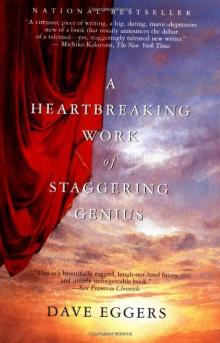 A Heartbreaking Work of Staggering Genius
A Heartbreaking Work of Staggering Genius The Best American Nonrequired Reading 2013
The Best American Nonrequired Reading 2013 How We Are Hungry
How We Are Hungry The Circle
The Circle What is the What
What is the What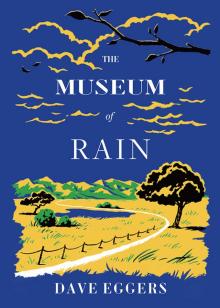 The Museum of Rain
The Museum of Rain The Captain and the Glory
The Captain and the Glory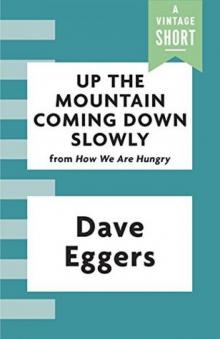 Up the Mountain Coming Down Slowly
Up the Mountain Coming Down Slowly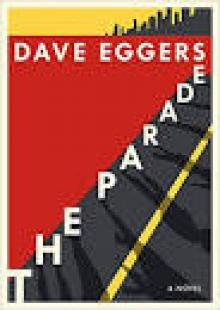 The Parade
The Parade The Monk of Mokha
The Monk of Mokha Your Fathers, Where Are They? And the Prophets, Do They Live Forever?
Your Fathers, Where Are They? And the Prophets, Do They Live Forever? You Shall Know Our Velocity
You Shall Know Our Velocity The Wild Things
The Wild Things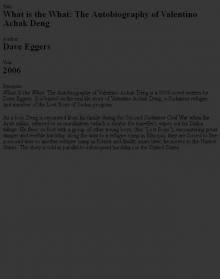 2006 - What is the What
2006 - What is the What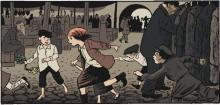 The Best American Nonrequired Reading 2011
The Best American Nonrequired Reading 2011 Created in Darkness by Troubled Americans
Created in Darkness by Troubled Americans